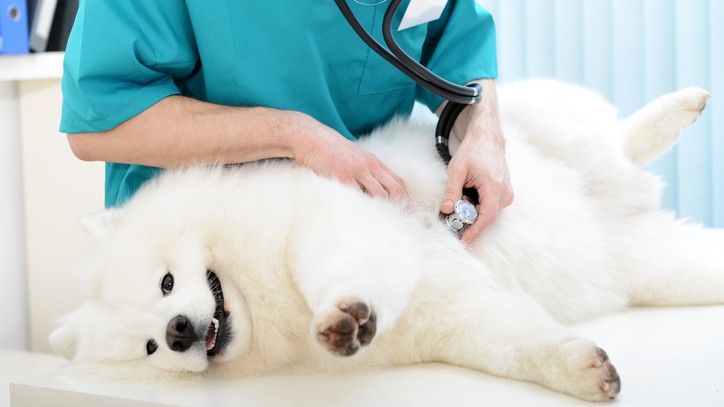False pregnancy in dogs: Vet's guide to causes and signs
Do you have questions about false pregnancy in dogs? Read on to find out the answers

What does a false pregnancy in dogs look like and how common are they? As well as standard pregnancies, our pets can experience a phantom pregnancy whereby a dog believes she is pregnant but isn’t, so it's understandable you may have plenty of questions as a dog owner!
This article will explore the causes and signs of a pseudopregnancy in a dog, including how to tell if your dog is having a false pregnancy and what to do.
For more information about pregnancy in dogs, be sure to familiarise yourself with the signs that your dog is in heat and, if you're planning to breed from your Fido, there’s even more information that you need to get to grips with, including how to tell if your dog is pregnant, how long are dogs pregnant for, and how to recognise Fading puppy syndrome.
What is a false pregnancy in dogs?
A false pregnancy, also known as a phantom pregnancy or pseudopregnancy is when a dog’s body believes it is pregnant when it isn’t. It can occur a few weeks after a dog’s season, regardless of whether they have mated or not.
Instead of the dog’s physical appearance and behavior returning to normal, hormone changes that are similar to those that occur in a true pregnancy cause false pregnancy symptoms to develop.
How common are false pregnancies in dogs?
The severity of a false pregnancy can vary. While some dogs will have many physical and behavioral symptoms, others only show one or two. This means that subtle signs can easily go unnoticed, and a large proportion of un-spayed female dogs will have some form of false pregnancy at some point.
On the other hand, a false pregnancy won’t necessarily follow every season, and if a dog has never had one, it doesn’t mean they never will.
Get the best advice, tips and top tech for your beloved Pets

How can you tell if a dog is having a false pregnancy?
You might know, or you may be able to hazard a guess at the symptoms of a true pregnancy in dogs. Towards the later stages of their pregnancy, they will become more hungry, their belly will enlarge, their mammary glands will produce milk and their nipples will swell.
But, can a female dog's nipples swell if not pregnant? Well, yes, they can. Swollen nipples or mammary gland development are both symptoms of a false pregnancy. They might even start producing milk (which your vet might check for).
However, aside from the physical symptoms, there are also behavioral changes. These include nesting, mothering behavior towards certain toys, anxiety, or even aggression. To diagnose a false pregnancy, your vet will need to examine your dog to make sure they are not carrying puppies.
Causes of false pregnancy in dogs
Following a season, a bitch's progesterone levels rise whether they are pregnant or not. This means that hormonally speaking, their body acts as though it is pregnant for around 2 months. This period is known as dioestrus. If the bitch is pregnant the progesterone will drop just before whelping, stimulating milk hormones to be produced.
If the progesterone levels drop very suddenly during dioestrus, this could mimic the same mechanism, leading to milk production and whelping behaviour in a non-pregnant dog. While the exact cause of what can trigger a false pregnancy in dogs isn’t known, neutering during the dioestrus period, or starting or stopping certain hormonal medications, carry the risk of false pregnancy.

Dr Hannah Godfrey is a small animal vet with a love of dentistry and soft tissue surgery. She lives in Wales with her partner, son, and their two cats.
How long does false pregnancy last?
Phantom pregnancies can vary in length. Most are mild and resolve on their own over a week or two. However, some can take longer to resolve, even with medication and changes to the dog’s diet and environment.
Are false pregnancies in dogs dangerous?
False pregnancy isn't dangerous and won't harm your dog. However, it can cause anxiety or aggression, which could lead to potentially dangerous situations in severe cases. Some dogs whine during false pregnancy too, which might lead you to think they are feeling painful or unwell. Thankfully, false pregnancy is not a painful condition.

Treating false pregnancy in dogs
If you’re wondering how to help a dog with a phantom pregnancy, rest assured, there are lots of ways. Firstly, it's important to visit your veterinarian to make sure your dog is well and isn't actually pregnant. If needed, they will prescribe medication to help stop them from producing milk. They’ll also advise on things you can do to help at home.
This would include removing any toys, blankets, or other items that your dog is nesting with or mothering. It’s also been suggested that reducing your dog’s food intake, or wrapping them in a stretchy bandage could help stop milk production, but you should never try these methods unless advised how to do it safely by your vet.
Summary
It’s not just the human body that’s complex – dogs’ bodies are too! So, if your dog is showing signs that they might be pregnant but they haven’t mated, it’s unlikely to be an immaculate conception! If you pop them to the vet for a check-up, your veterinarian can check for a false pregnancy and give you helpful advice on how to treat it.
Dr Hannah Godfrey is a small animal vet who graduated from the Royal Veterinary College in 2011 and began work straight away at a busy mixed practice. Initially, she treated all species, but focussed on small animals from 2014. She has a passion for soft tissue surgery, ultrasound, and canine and feline dentistry, having completed additional training in these areas.
